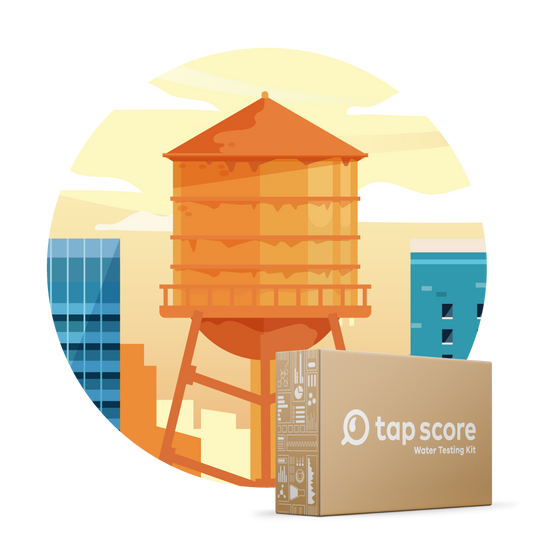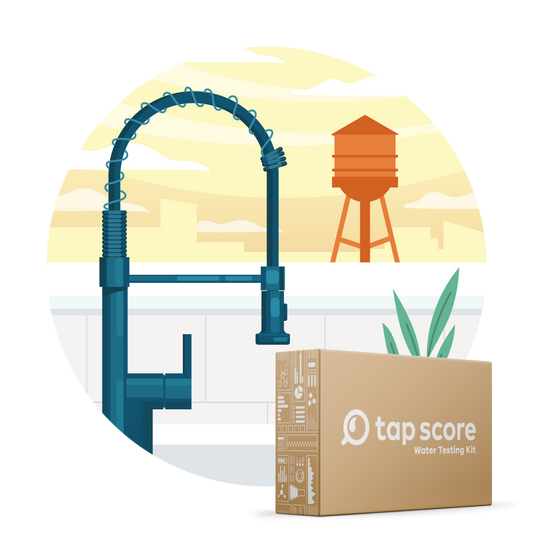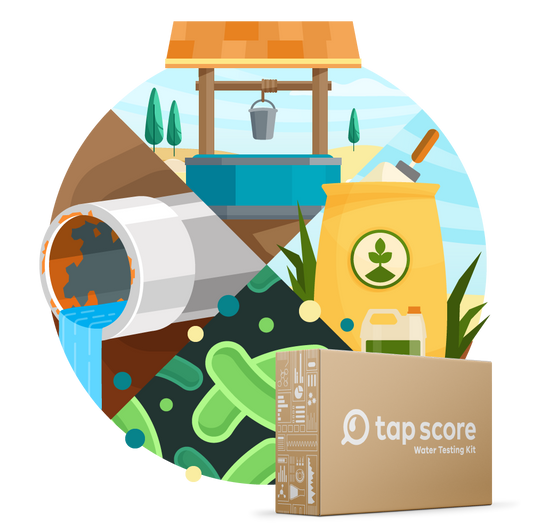
How Do You Pick the Best Water Filter for Your Home in 2026?
Our blog is written by real experts— not AI. Each guide is carefully reviewed and updated based on the latest research. Plus, with no affiliate links, you can count on unbiased insights you can trust.
Looking to choose a water filtration system for your home? We wrote this ultimate guide in order to help you feel empowered when deciding which water filtration technology to invest in. In fact, after reading this guide, you might discover you don’t even need a filter at all.
Table of Contents:
- What’s In Your Water?
- Finding the Right Treatment Technology
- The Importance of Certification
- Filtering Right: Top Tips for Filter Life
- What’s the Best Water Filter for You?
Key Takeaways
- While having your water tested by a lab will cost more up front than some other popular options, lab testing is required for reliable and case-specific information about your water.
- Water filter technologies can be divided into four main types: membrane filters, adsorption, ion exchange, and disinfection.
- The best water filtration system is the one that best addresses your home’s water quality and your personal preferences.
- Proper installation and maintenance is the only way to safeguard your treatment device’s longevity and effectiveness.
What’s Actually in Your Water?
The first — and most important — step toward picking the right water filter is evaluating your water quality so you can learn what you need to filter out. In order to do that, you’ll want access to unbiased water analysis..

How? Well, there are a couple reliable routes available:
Public Water Quality Data
The Federal Environmental Protection Agency (EPA) regulates the drinking water provided by public water systems through the Safe Drinking Water Act. The EPA’s main list of contaminants in tap water with associated health risks in includes over 100 contaminants.[1] Some of the most common drinking water contaminants include:
- Lead
- Arsenic
- PFAS
- Iron
- Uranium
- Disinfection byproducts (city, or chlorine disinfected water)
- Nitrates (private well water)
- Coliform Bacteria (private well water)
While publicly available water quality data exists through a variety of databases, the vast majority of public water data is only reflective of water samples collected at the water treatment plant. Usually, these samples are collected annually.
For general information on last year’s water quality in your area, take a look at:
However, this means the data is not indicative of the water quality flowing through your household tap because it hasn’t yet passed through the local distribution system or your home’s plumbing.
Laboratory Water Tests
To get the most detailed picture of your water quality, you should invest in a mail-to-lab home water test kit.
But while drinking water test kits that rely on a laboratory for analysis carry increased up-front costs, the robust body of information they provide often helps save you money down the line.
For example, if you don’t test your water before buying a filtration system, you could be wasting your money by buying a treatment system that isn’t tailored to your specific water quality.
Public Water Systems
Customers of public water utilities (or “city water” as it’s often called) will benefit from the Advanced City Water Test kit. It provides everything you need to properly collect and submit a water sample for certified laboratory testing.
Includes analyses of common water chemistry parameters and health concerns, like water hardness and pH, as well as heavy metals, volatile organic compounds, and frequently detected disinfection byproducts from the addition of chlorine and chloramine.
Private Well Systems
Tap Score also offers home water testing kits for private well owners that are specialized to address contaminants such as hardness, silica, heavy metals, minerals, nitrates, and coliform bacteria, which are important to test for annually.
Recommended if you’ve never tested your private well before. The most comprehensive water test kit for well water, which includes additional risk factors including radioactive particles, radon, tannins, bacteria, plasticizers and pesticides.
Results provided through Tap Score’s water analysis kits include a full list of contaminants detected in your water, as well as benchmarks to help make sense of the concentrations of the contaminants
What About Water Test Strips?
DIY water test strips for homes are inadequate for comprehensive water quality testing. They can be useful for simple parameters like chlorine levels and pH, but for contaminants worth filtering out, you want the detection accuracy only laboratory water analysis can provide.

Contaminants like lead, arsenic, DBPs, VOCs, and PFAS all require the equipment and expertise of a lab setting.
Lab Tests or Test Strips: What's the Best Water Test?
Where Can You Get Your Water Tested for Free?
Some water utilities offer laboratory water testing for free. They are usually tailored to a handful of local contaminants, sometimes only one in particular.
Do not accept a free water test from a filtration company. Those are usually sure-fire ways to get strong-armed into investing in the treatment system they want you to invest in, and not one meant for your specific needs.
Finding the Right Treatment Technology For Your Needs
Different contaminants require different treatment technologies — no single technology can fully remove everything (despite what filtration companies claim). Testing is the first step to finding the right treatment solution.

With a laboratory water quality report you can then determine the best filtration technology(s) for your specific contaminant profile.
Understanding how each treatment system may impact your water is key to being satisfied with your setup. Knowing what you want and what you don’t want (a filter that requires frequent maintenance, for example) will help with your selection process.
Common Water Treatment Technologies
There are many various treatment technologies in filters for household use. They include:
- Activated Carbon
- Reverse Osmosis
- Anion Exchange
- Cation Exchange (aka Water Softener)
- UV disinfection
- Chlorination
- Oxidation and Filtration
- Aeration
- Distillation
However, most household water treatment technologies can be grouped into four major categories:
- Membrane filtration
- Adsorption
- Ion exchange
- Disinfection
We’ve covered them in detail in the Top 4 Water Filtration Technologies for Homes, but here’s a quick summary:
Membrane filters
Membrane filters use high pressure to push water through pores that are too small to allow certain contaminants to pass through.The contaminants that they effectively remove depends on the size of their pores, ranging from 0.1 micron to 0.0001 micron.
Adsorption
Adsorptive media filters remove contaminants by adsorbing (or binding) specific substances onto their surface. They are highly versatile and used in common point-of-use devices like pitcher filters. Contaminants stick to the filter media as water flows through the filters.
Ion exchange
Ion exchange filters contain resin beads with charged ions attached to their surface, exchanging unwanted ions in the water with harmless ones. They are typically point-of-entry systems. Water softeners are a type of cation exchange, specifically exchanging hardness-causing ions like calcium and magnesium for sodium or potassium ions.
Disinfection
Disinfection technologies only address microbial risks and should be considered only when bacteria and other microorganisms have been detected. Common disinfection technologies include UV disinfection and chlorine.

You can also read unbiased reviews about some of the most popular home water filtration brands:
Personal Preferences: What Matters Most?
Choosing the right product requires thinking about your personal needs and requirements. Do you live in a small apartment or do you have a giant garage? Do you need to treat ALL of the water flowing through your pipes or just the drinking water?
Installation location
Choosing the right installation location is really important. Water treatment devices are divided into two types:
- Point-of-Entry (POE): Treatment devices that filter the water where it enters the household
- Point-of-Use (POU) : Treatment devices that filter the water where it exits the tap
For example, because lead was commonly used in household plumbing networks, a point-of-entry system that filters your water before it passes through your pipes opens it up to re-contamination. In this case, you’d want a point-of-use solution (i.e., a counter-top, under-sink, or pitcher unit).
Property specifics
Whether you rent or own your home makes a big difference as well. Rental properties often specify what can and cannot be modified.
Additionally, municipal tap water and well water can contain different types of contaminants. The following guides can help you understand the intricacies of each:
Renters Guide to Water Testing and Filtration
Best Water Test Kits for New Homeowners
Ultimate Guide to Well Water Contaminants
Why Are Certifications for Water Filters Important?
You want to know that the filter you purchase is effective and reliable at removing the contaminants that matter to you. That’s where certifications come in. Third-party testing is helpful to sort through the noise.
In the absence of any federal regulation of treatment devices, specific third-party organizations help provide consumers with unbiased information about which products will be effective for their water treatment needs by certifying products to specifically designed treatment standards (i.e., NSF/ANSI standards).
Without certifications like these, the only information we have about a product’s effectiveness comes from the company selling the product. While it is likely that much of this information is accurate, there are no guarantees.
The three main organizations that certify water treatment devices are:
- Water Quality Association (WQA)
- National Sanitation Foundation (NSF)
- International Association of Plumbing and Mechanical Officials (IAPMO)

While certifications aren’t mandatory, they are a helpful guidepost. Even if a product works as promised, there’s no way to know a company’s intentions behind not getting certification.
We recommend taking the extra time and looking into products that have proper certification when choosing a product for your home.
NSF/ANSI Certifications Explained
If you need help picking between brands and products with the right certifications, you can contact us. Or check out some of these guides to certified water filters by contaminant to help your decision-making process:
Quick Guide to Faucet Filters
Quick Guide to Certified Water Filters for PFAS
Quick Guide to Certified Water Filters for Lead (Pb)
Quick Guide to Certified Water Filters for Fluoride
Quick Guide to Certified Water Filters for VOCs
Top Tips For Water Filter Life
Certified professional installation
If you purchase a product that requires complex installation, be sure to get professional help. Point-of-entry filtration systems are often larger, more expensive systems and require more expertise with plumbing.
The Water Quality Association keeps a robust record of certified water filtration installation personnel across the USA. Consult the WQA Find a Member directory and be sure your product is properly installed. IAPMO maintains a similar directory, but be aware that it extends beyond water filtration.
Follow the instructions
No engineered product works properly unless the instructions are followed. The instructions will specify things like proper upkeep, recommended breaking-in period, proper flow rates, etc.
Maintenance and upkeep
Every filtration technology has different maintenance requirements. Be sure to follow them carefully. If you live in a large household with high water use, your filter’s lifespan will be shorter than if your water use was lower. Keep track of the months between filter changes. The leading cause of filter failure is people forgetting to change the filter on time.
Pay attention to what kind of water goes into your filter: some POU filters can be compromised by hot water; some POE filters can be compromised without adequate pre-filtration.
Performance testing
Performance testing is the best way to know your filter is working properly. A performance test is a water test of your filtered water. In order to accurately gauge the filter’s performance, however, you’ll want to know the quality of your water before the filter is installed. That’s easy if you tested your water before purchase. Once you test your filtered water, you can compare those results to your initial test to see how effective your new filter is at reducing your contaminants of concern. Remember to test only after the filter’s breaking-in period.
Breaking in your filter
Each system requires its own “break-in” period, or a volume of water required to flush the filter before routine use begins. Why? Because this delay allows the new equipment to adjust to your plumbing and your daily patterns of water use. It also helps flush out the materials used in the manufacturing of your filter system—like polymers, metals, volatile organic compounds (VOCs), etc.
What's the Best Water Filter for You?
There’s really no one-size-fits-all answer: The best water filter for you depends on your water quality and your personal preferences. Different treatment technologies are effective for different contaminants, and they all have their own pros and cons.
- For common concerns like taste or smell, pitcher filters can be very helpful. Some even sell advanced filters for contaminants like lead and PFAS. Be sure to look for certification!
- For advanced concerns like heavy metals, PFAS, or disinfection byproducts (DBPs like trihalomethanes and haloacetic acids), you might want a more advanced undersink system—e.g. reverse osmosis, ion exchange
- If you’re willing to invest in your home’s water treatment, you can consider a whole-home water filtration system. These will filter all the water in your home and require professional installation
For all these and more, a little pre-emptive investigation through water testing goes a long way!
Read More
▾Heavy Metals Everyone Should Test For
Your Water's General Chemistry
The Ultimate Guide to PFAS
Pathogens That Contaminate Drinking Water
What Is a Consumer Confidence Report (CCR)?
Top 4 Most Popular Water Filtration Technologies For Homes
NSF Certifications Explained
POE Versus POU Water Treatment








